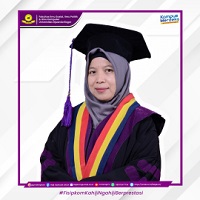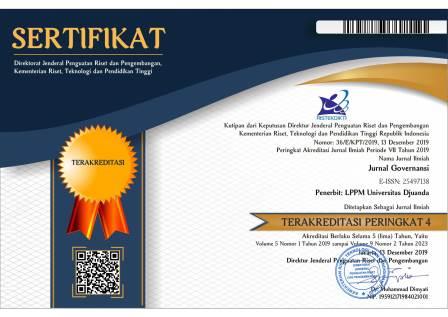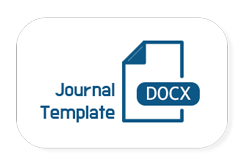Tourism Development Policy Through the Mojang Jajaka Event as a Tourism Ambassador
DOI:
https://doi.org/10.30997/jgs.v9i1.8005Keywords:
Policy Implementation, Tourism Office, Mojang Jajaka Bogor DistrictAbstract
Bogor Regency is one of the tourist destinations in Indonesia because it has a lot of tourism potential, such as nature tourism, cultural tourism, and others. The Department of Tourism and Culture involves these Mojang Jajaka accompanying in every government activity and assisting in promoting tourism or environmental issues, where tourism and culture are one of the PAD in Bogor Regency. This research is expected to be able to formulate a tourism development model through the Mojang Jajaka event or a policy implementation model in the context of developing special knowledge related to public policy. The theory used in this research is Edward III Communication, Resources, Disposition, Implementation and Bureaucratic Structure. The communication referred to in this research is the Bogor Regency Tourism and Culture policy to socialize the objectives of implementing the Bogor Regency Tourism Office's policy. Management tools according to Harrington Emerson in Phiffner John (1960) have five elements (5M), namely: Men, Money, Materials, and methods. The tendency or attitude in implementing the policy plays an important role in the success of the policy, therefore the implementer of the tourism policy stated in Law Number 10 of 2009 is based on the attitude and views held. The processes that exist in the bureaucracy can run if they are consistent, efficient and efficient so that they do not conflict with the existing bureaucratic regulations into 2 SOPs and the Distribution of Responsibilities in the Context of Policy Implementation for the development of tourism in the Mojang Jajaka event.
References
Abdul Wahab, Solichin. (2008). Analisis Kebijakan: dari Fora si ke Implementasi Kebijakan Negara edisi Kedua. Jakarta: Bumi Aksara.
Agustino, Leo. (2008). Dasar- Dasar Kebijakan Publik. Bandung: Alfabeta.
Kriyantono, Rahmad. (2009). Teknik Praktis Riset Komunikasi. Jakarta: Kencana Prenda Media Group.
Moekijat. (2000). Kamus Manajemen cetakan ke -5 CV. Bandung: Mandar Maju.
Moleong, Lexy J. (2004). Metologi Penelitian Kualitatif. Bandung: PT. Remaja Rosdakarya. Nasution, S. (2002). Berbagai Pendekatan dalam proses belajar mengajar. Bandung: PT. Bumi Aksara.
Rusady, Ruslan. (2006). Metode Peneltian public Relation dan Komunikasi. Jakarta: PT Rajagrafindo Persada.
Silalahi, Oberlin. (1989). Beberapa Aspek Kebijaksanaan Negara. Yogyakarta: Liberty.
Sudjarwo. (2001). Teknik wawancara dan proses data untuk tujuan penelitian, Jakarta: Gramedia.
Suteng, Bambang. (2006). Pendidikan Kewarganegaraan. Jakarta: Erlangga.
Tahir, Arifin. (2014). Kebijakan Publik dan Transparan Pengelenggaraan Pemerintahan Daerah. Bandung: Alvabeta.
William N, Dunn. (2012). Pengantar Analisis Kebijakan Publik edisi Kedua, Yogyakarta: Gadjah Mada University Press.
Hoogerwerf, Andries. (1990). Reconstructing Policy Theory. Avaluation and program planning. Vol 13 (pp) 285-291.
Imron, Ali. (2002). Kebijakan di Indonesia. Jakarta: PT Bumi Aksara.
Ismayanti. (2010). Pengantar Parawisata. Jakarta: Gramedia Widiasarana Indonesia proses: A Concentual Framework in: Administration and Society Vol 6 (4). 445-485.
Van Meter, Donald & Van Horn, Carl E. (2002). The policy Implementasi. Vol 8 (1). 24-36.
Winrno, Budi. (2008). Kebijakan Publik Teori dan Proses. Jakarta: PT Buku Kita.
Nugroho, Iwan. (2013). Peran kepemimpinan dan Inovasi dalam Pengembangan Kewirausahaan Ekowisata berbasis penduduk local. Diselenggarakan Fak Pertanian Univ Widyagama Malang dan Program Pascasarjana Universitas Brawijaya. Niversitas Widyagama Malang, 12 November 2013. ISBN: 978- 602- 14594-9
Undang- Undang No. 23 tahun 2004 pemerintah daerah
Undang-undang No. 25 Tahun 1999 Tentang Perimbangan Keuangan antara Pemerintah Pusat dan Daerah
Undang-undang No. 9 tahun 1990 Tentang Kepariwisataan
Undang-undang No. 10 Tahun 2009 Tentang Kepariwisataan.
Downloads
Published
How to Cite
Issue
Section
License
Copyright (c) 2023 Nadia Amalia, Ruslyandi

This work is licensed under a Creative Commons Attribution-ShareAlike 4.0 International License.
Authors who publish with Jurnal Governansi agree to the following terms:
- Authors retain copyright and grant the journal right of first publication with the work simultaneously licensed under a Creative Commons Attribution 4.0 International License that allows others to share the work with an acknowledgement of the work's authorship and initial publication in Jurnal Governansi.
- Authors are able to enter into separate, additional contractual arrangements for the non-exclusive distribution of the journal's published version of the work (e.g., post it to an institutional repository or publish it in a book), with an acknowledgement of its initial publication in Jurnal Governansi.
- Authors are permitted and encouraged to post their work online (e.g., in institutional repositories or on their website) prior to and during the submission process, as it can lead to productive exchanges, as well as earlier and greater citation of published work.



















